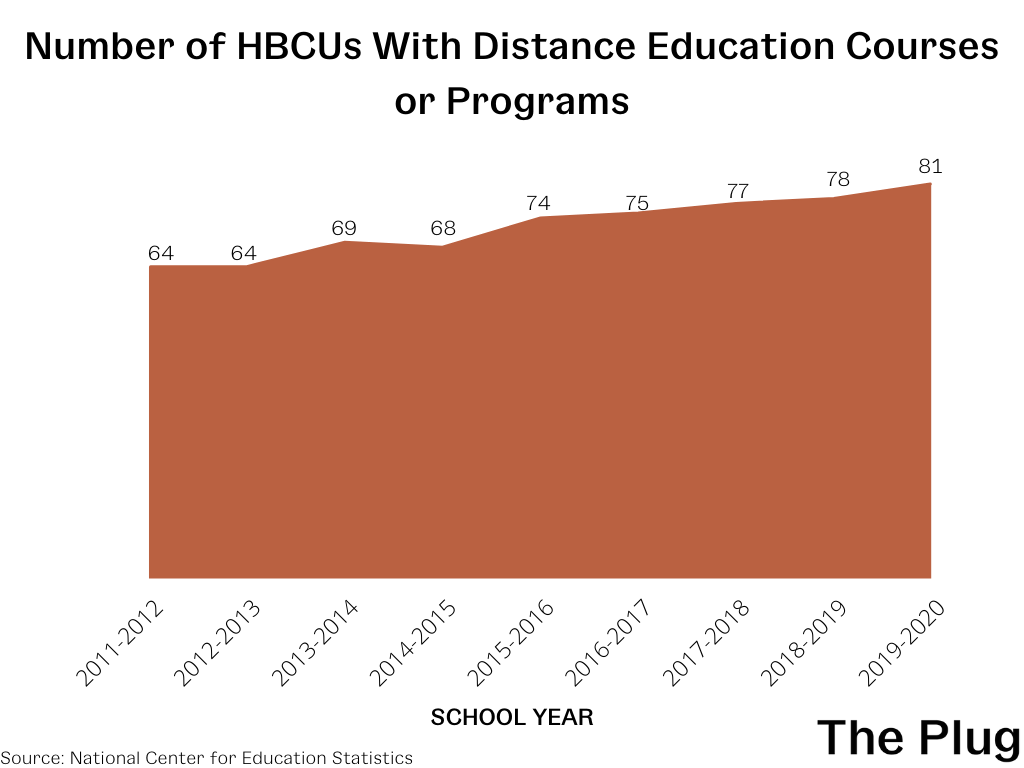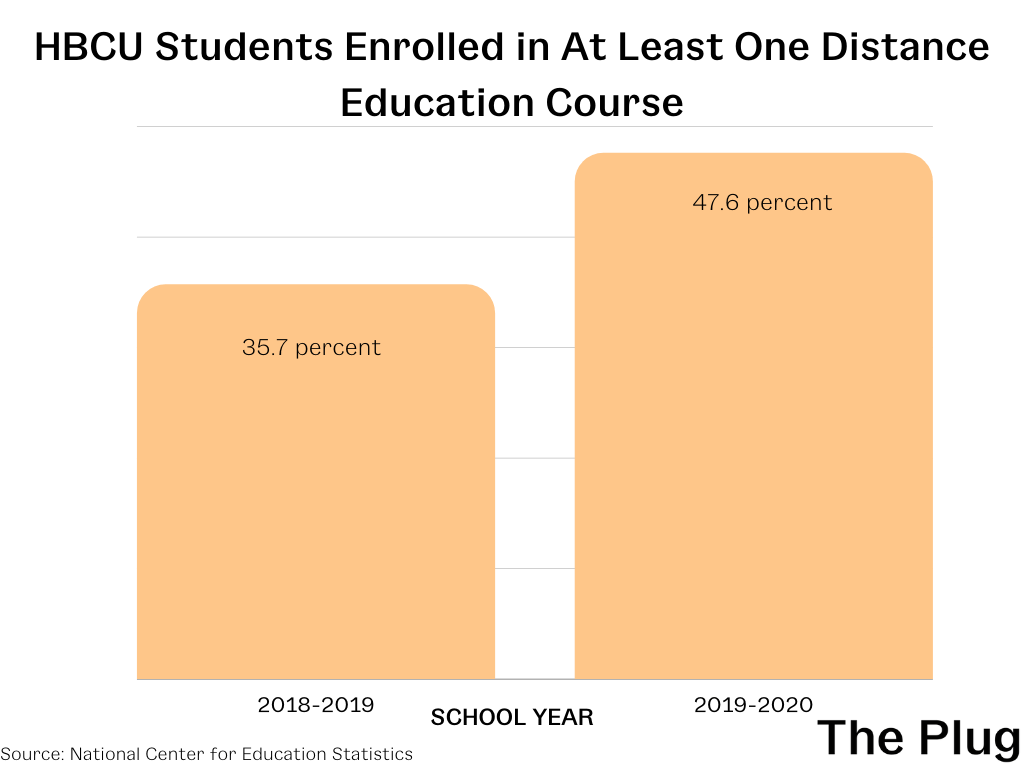Interested in getting HBCU stories straight to your inbox? SIGN UP for our executive HBCU newsletter to make sure you get exclusive videos, news and analysis in your inbox every Wednesday morning.
KEY INSIGHTS
- Despite the first online courses being developed in 1993, it has taken decades for HBCUs to widely adopt the technology.
- In March 2020, HBCU students had to turn to online classes, which meant faculty had to quickly get trained on how to shift their courses online.
- Now through designing online platforms catered towards the specific needs and culture of HBCUs, schools are starting to create their future of online learning.
In what once was a lively and bustling campus, filled with the sounds of student life, Parlay the Golden Tiger, Tuskegee University’s mascot, walks around the now empty red-brick campus, visibly forlorn. To the tune of Bobby Vinton’s “Mr. Lonely,” Parlay finds himself inside an empty classroom, along with his laptop, in what is a representation of what many students were living in March 2020 after the pandemic halted college life as they knew it.
Few, if any, HBCUs were prepared. Two years later, HBCUs are still reimagining online education after the pandemic radically shifted how we learn and work.
The online landscape before the pandemic
Despite the first online courses being developed in 1993, it has taken decades for HBCUs to widely adopt the technology.
“Before the pandemic, when you looked at the online learning space and just tried to understand the calculus of what it would take to do those innovations versus the benefits, the benefits might not have been there for a number of our institutions,” Julian Thompson, Director of Strategy for the UNCF Institute for Capacity Building, told The Plug.
A major reason is lack of resources. HBCUs have been systematically underfunded and on average have deferred maintenance backlogs. Repairs that were not performed when they should have been is an issue across HBCUs. In 2018, the Government Accountability Office found that on average, public HBCUs reported deferred maintenance backlogs of $67 million while at private HBCUs it was $17 million.
A 2018 study by education researchers examining HBCUs and online learning found that “technology requires a constant cash flow. For HBCUs struggling to stay afloat, the costs can be a stretch, or even an impossibility.”
But in recent years there has been a steadily growing adoption of online learning by HBCUs and their students. In the 2011-2012 school year, just 64 of the 102 federally recognized HBCUs offered distance education courses or programs, according to an analysis by The Plug of data from the National Center for Education Statistics (NCES). By 2019-2020, the most recent data available, 81 HBCUs offered at least one distance education course.

During the 2019-2020 school year, of the HBCUs that offered undergraduate distance education courses, on average nearly half of students were enrolled in at least one distance class, NCES data shows. It was a double-digit increase over the previous school year when on average only 36 percent of students were taking an online class.

But though HBCUs were slowly adopting online teaching, the pandemic increased the urgency.
“By the time I had finished my first semester [at Morehouse], it was very clear to me that we needed to be looking at online [education],” David Thomas, President of Morehouse College since 2018, told The Plug. “Then the pandemic hit and that accelerated our consideration and pace of getting there.”
HBCUs make pandemic pivots
In mid-March 2020, HBCU students had to turn to online classes under strict lockdown rules that moved them out of the classroom, which means faculty had to quickly get trained on how to shift their courses online.
“I equated what happened in the spring to being on an aircraft carrier in the Pacific, and getting pushed into the ocean and then told to learn how to swim,” Wayne Dawkins, an Associate Professor at Morgan State University, said in a recent study examining how communications programs at HBCUs pivoted in the pandemic.
But some organizations started offering life rafts to professors.
“I quickly got on the phone with UNCF and some institutional leaders and said, ‘How can we support? We have decades of supporting learners online, building impactful courses and so we would love to extend our work and be supportive during the pandemic,’” Crystal Moore, Vice President of New Program Strategy and Innovation at Strategic Education, told The Plug. Strategic Education owns the for-profit online Strayer University and Capella University, among others.
In June 2020, Strategic Education began providing training not just on the tools of online learning, but also on developing courses for the online space and engaging students virtually.
“Some people were just starting at base level,” Moore said.
“They had never been in their [learning management system]. They had never taught a course online and all of a sudden they had a hard pivot where they had to do this on top of all of the life things that were happening — the pandemic, the shutdown,” Moore said. “It was an emotional time but it was also a time where faculty stepped up and tried to be present and engaging with students online.”
The pilot program started with around 400 faculty members at 14 HBCUs, but has since expanded to training 2,000 faculty at 100 HBCUs and predominantly Black institutions.
Looking to the future online
Now that the initial urgency to create online classes has died down, HBCUs are starting to institute what online learning looks like at their campus.
For starters, since summer 2020, Morehouse has required all its faculty to be certified in online education. In early 2021, the college also announced its first fully online bachelor’s programs and has partnered with at least one corporation to allow employees who have some college credits but haven’t finished their degree to enroll.
The UNCF Institute for Capacity Building is also pushing HBCU online education beyond just Zoom and Canvas by creating a new online platform called HBCUv.
Backed by $10 million in grants and technological support from Deloitte Digital, HBCUv is bringing HBCUs to the table to design what an online platform catered to the specific needs and culture of these historic institutions looks like.
“One of the things that we thought was very important was thinking of this first as a learning ecosystem,” Valora Richardson, Director of Digital Solutions and Innovation at UNCF, told The Plug.
“We are not trying to recreate the HBCU experience online. We’re just trying to reimagine it virtually,” Richardson added.
Details of which courses will be offered from the nine initial partner schools are still being discussed. The pilot is slated to launch in January 2023 and students will be able to cross-register in classes offered by schools other than their home institution.
Another way that HBCUs are reimagining online education is through incorporating the metaverse, a virtual universe where people can live, work and interact with other people who are not in the same physical space.
In late March, Clark Atlanta University was awarded an $11.8 million grant from EON Reality, an augmented and virtual reality company, to establish a Knowledge Metaverse Hub at CAU.
Through the Knowledge Metaverse, “students can transform their bedrooms into laboratories,” according to EON Reality. “Galleries can display biographies and similar works by their resident artists, or bring the entire exhibit to a user’s home,” the company adds.
This is not EON Reality’s first time working with an HBCU. In February, the company announced a partnership with Meharry Medical College to give students virtual and augmented reality tools to enhance their medical training, although they did not disclose if a grant to the college was also awarded.
While two years is not enough time for institutions as varied and under-resourced as HBCUs to be at the pinnacle of technological advancement, it is clear an important evolution is underway.








